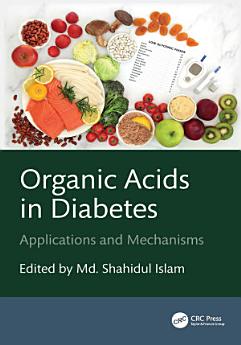Organic Acids in Diabetes: Applications and Mechanisms
About this ebook
Key Features
- Explores the roles of phenolic acids and non-phenolic bioactive organic acids on oxidative stress, diabetes, and associated complications
- Covers the effects of phenolic and non-phenolic organic acids on glycaemic control, impaired glucose tolerance, insulin resistance, and intestinal glucose absorption
- Reviews the role of organic acids in different types of diabetes-related complications, including diabetic nephropathy, diabetic neuropathy, diabetic cardiomyopathy, diabetic retinopathy, diabetic foot disease, and skin ulcers
- Examines the impact of organic acids on other closely associated diabetes-related disorders, such as overweight, obesity, and dyslipidaemia
- Discusses the molecular mechanisms behind the effects of phenolic and non-phenolic organic acids on diabetes and its associated disorders
About the author
Md. Shahidul Islam, BSc (Hons), MSc, PhD is Full Professor of Biochemistry and Academic Leader of Biotechnology Cluster under the School of Life Sciences, University of KwaZulu-Natal, Durban, South Africa. Apart from serving as a Member of the Editorial Board, Review Editor, Associate Editor and Guest Editor of a Number of peer reviewed, he has been serving as a Co-Editor-in-Chief of the World Journal of Diabetes since 2021. His research diabetes mellitus has been started in 2005, when he was working as a Postdoctoral Fellow in the Seoul National University, South Korea after his PhD in Nutritional Science from the Okayama University, Japan. His PhD Research in Japan achieved an award from the Japanese Society for Surgical Metabolism and Nutrition (JSMN) during post PhD period. Trained as a Biochemist via his BSc (Hons) and MSc degrees in Biochemistry from the University of Dhaka Bangladesh, he has also completed another Postdoctoral Fellowship from the North-West University, Potchefstroom, South Africa and spent a considerable amount of time as a “ CV Raman Visiting Research Fellow” at the Department of Biochemistry and Stem Cell Research, National Institute of Nutrition (NIN), Hyderabad, India and as a “Visiting Associate Professor” at St. Claraspital Hospital, University of Basel, Basel, Switzerland.
Prof. Islam achieved “Distinguished Teacher Award 2015” and “Top30 Researcher Award 2017, 2019, 2021 and 2023” from the University of KwaZulu-Natal, Durban, South Africa. He also achieved a number of awards from International Endocrine Society, Korean Endocrine Society, Japan Diabetes Society, Pacific Science Association, International Diabetes Federation and many others in the previous years. Very recently, Prof. Islam’s name has been announced as a “Fellow of the University of KwaZulu-Natal” one of the Topmost honor of the University of KwaZulu-Natal to any academic. Prof. Islam has been rated as an internationally recognized established researcher by the National Research Foundation (NRF), South Africa. Currently, he is also serving as a regular reviewer of more than 20 international peer reviewed journals and worked and working as a Member of the Editorial Board or Associate Editor of many international journals. Prof. Islam has been selected as one of the Global Top 2% researcher since 2019 and as one of the Global Top 0.016% researcher in the area of Experimental Diabetes Research by Expert Escape during 2021. So far Prof. Islam published 14 peer reviewed book chapters, more than 225 research articles in the international peer reviewed journals including 11 reviews and number of editorials since 2004. He has successfully supervised the research projects of 3 Postdoctoral Fellows, 11 PhD, 10 MSc and 24 Honors level students since 2009. His current h-index: 48, i10-index: 179 and total citation 8324 as per Google Scholar.




